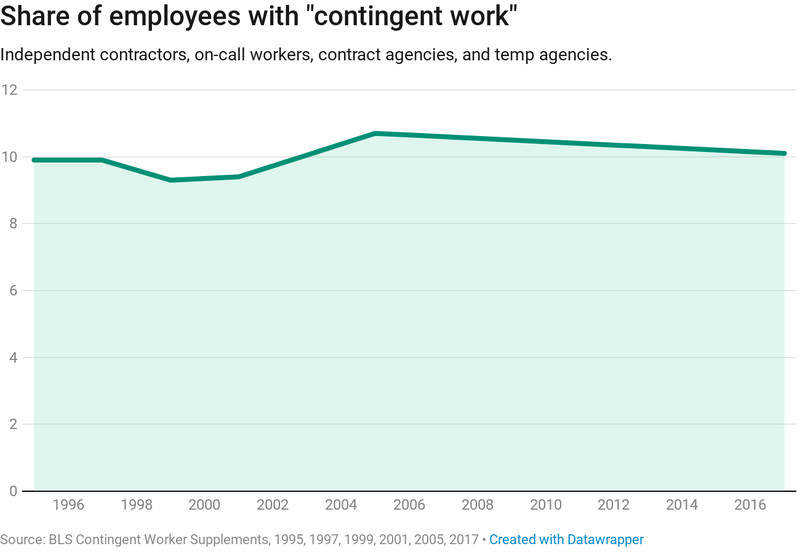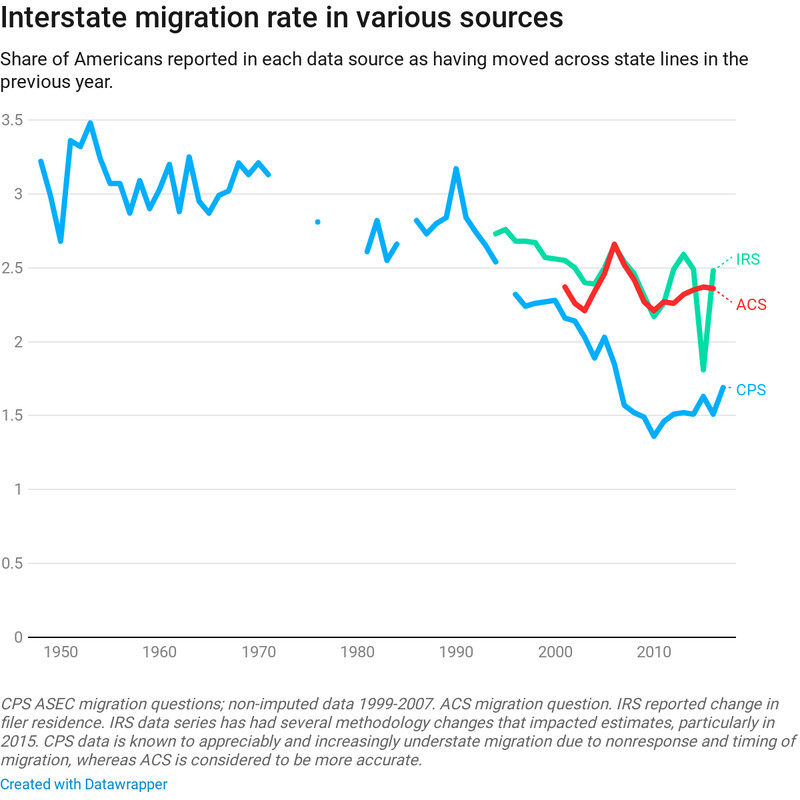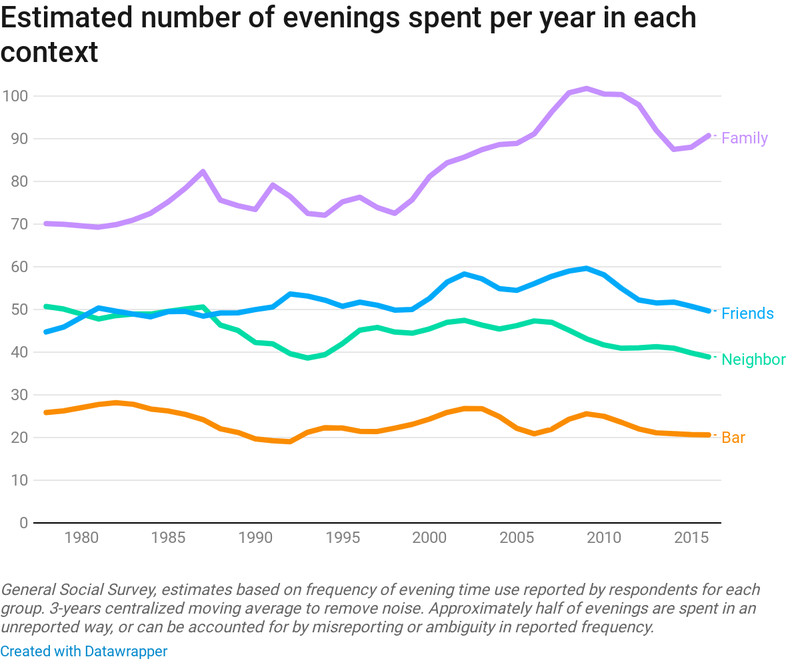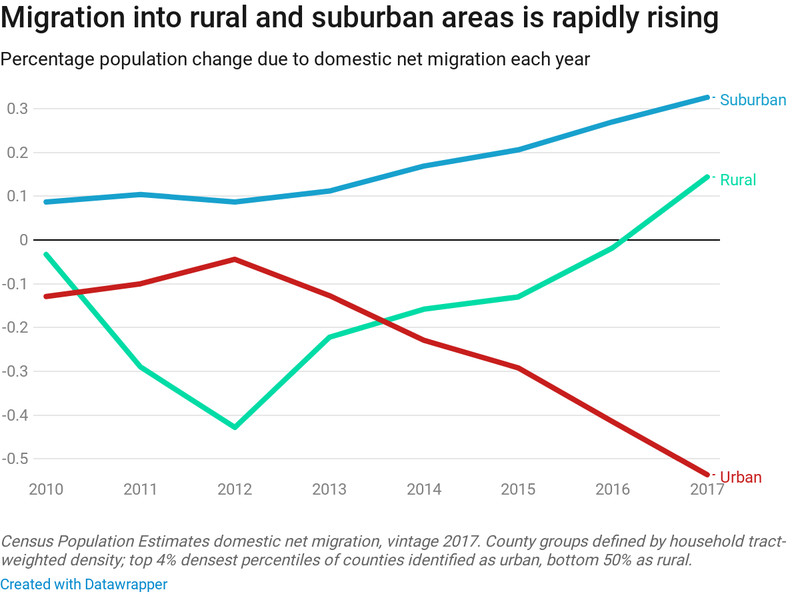Hype about the “gig economy” aside, Americans are becoming more attached to their jobs and communities, not less.
American society is becoming more and more rooted, permanent, and stable. This conclusion is the opposite of the take on social change you will hear in most public commentary. And the trend is a bad development.
You might have been led to believe that millennials, for example, were major participants in the booming “gig economy,” in which multiple relationships with independent contractors are cobbled together to form a career. But a recent survey by the Bureau of Labor Statistics shows that the share of workers working under “gig”-style frameworks has actually declined in the past 10 years. The hype about an increasingly dynamic, untethered, independent workforce was just wrong.
 Lyman Stone
Lyman StoneThat’s not the only take on rootedness in recent years that’s, well, untethered from reality. By a number of measures, Americans today, including millennials, are less mobile, less likely to switch jobs, and generally more rooted in specific geographic areas than their predecessors.
You might expect me, as a social conservative, to argue that this is a good thing because “have less change” is sort of a conservative motif. But in fact, a shift toward increasing rootedness is a worrying break with the historic American norm of dynamism and mobility.
Yet the myth of unrootedness persists. For example, Forbes would like you to know that millennials are congenital job-switchers. In a recent piece, the magazine made the case that millennials prefer to hop between many jobs. And yet, the Bureau of Labor Statistics survey of job turnover shows that job-quitting rates are lower today than in 2000.
Average employee tenure for people under 35 — 2.8 years — has been basically unchanged since 2006; in fact, it’s about the same as it was in 1983. Other metrics, like the number of employers in the past year, are also either stable, or show a trend toward stasis.
In other words, we are currently living in a period of elevated levels of employment stability, not employment dynamism. The job-hopping millennial — indeed, the job-hopping American — is a myth.
We’re moving less, too
But maybe “rootlessness” exists but has to do with something other than jobs. Maybe it’s about people moving from city to city. But internal migration, too, is at fairly low levels. The average length of time Americans over 18 have lived in their current home is rising, up to 12 years from just nine in 1960, according to Census data. Even among the relatively mobile crowd of 25- to 55-year-olds, average residency is pretty stable, holding at about eight years since 1960. Far from becoming rootless, we seem to be putting down deeper roots.
Now, it is true, in decennial census data, that the share of Americans who live in the state where they were born is declining: While a roughly stable share of around 65 to 70 percent of Americans resided in their state of birth from 1850 to 1950, that share has since declined to under 60 percent. But this is largely attributable to the life choices of the boomer generation, which was far more mobile than the generations before it. Americans today have lower migration rates than boomers had, as annual data shows:
 Lyman Stone
Lyman StoneWe’re spending more time with our families
But maybe, when the image of rootless millennials is conjured up, it doesn’t refer to employment or geography. Maybe it refers to a growing alienation from traditional social forms. We might think that millennials spend less of their social time with family members, instead hanging out on social media —or with peers as opposed to kin.
 Lyman Stone
Lyman StoneBut it turns out that the mean number of evenings 25- to 35-year-olds report spending with relatives is rising! Meanwhile, evenings spent with friends have basically plateaued, or even fallen. Generationally speaking, a “typical” millennial social event is dinner with cousins and Snapchatting with friends later in the evening, whereas our parents or grandparents spent their evenings with friends or co-workers instead of, well, us.
Far from a world shifting from “kinship-based social norms” toward “friends and classmates,” what we can actually see over time is a shift in social time toward family members and away from casual acquaintances and geographically defined forms of community, including neighbors.
Indeed, the average number of family members an American has in their household, after falling every decade since 1850, has finally stopped falling: Americans have stabilized at about 2.2 or 2.3 of their family members living in the household with them.
This rising rootedness and attachment to the status quo show up in public opinion data as well. For example, according to the General Social Survey, a plurality of people now believe that science is causing our society to change too fast: As recently as 2008, a large plurality expressed disagreement with that statement. Americans are getting more concerned about many forms of change. We want to put down roots and slow the whirlwind of change a bit.
We’re not all moving to Williamsburg (or its sister neighborhoods in other cities)
And while the recession saw a boom in population in dynamic urban cores, the recovery has actually seen domestic internal migration shift toward more staid rural counties over more urban ones, as we can see in census population estimates.
 Lyman Stone
Lyman StoneThese changes show up in American ethnographic data as well. Many Americans are “forgetting” their immigrant identities. While Mexicans are the fastest-growing self-identifying ancestry group in America, the second-largest is the group that gives its ancestry as “White,” “Just White,” or “Caucasian.” That is, these people who once would have said they are Irish-American, or German-American, or Italian-American now no longer do so.
This is a kind of rootedness: The last ties extending across the Atlantic have been cut. The immigrant mythology is dying out. New roots are being put down, after centuries of living here, and those roots ignore countries of origin. (There can be a dark side to this kind of white-ethnic self-identification, to be sure.)
There are other spheres, of course, in which millennials may truly be less rooted. We have lower homeownership rates, a very practical measure of connection to specific communities. But the reason we have lower homeownership rates is that we came of age during a massive recession and credit crunch. Today, millennials are finally buying houses at a good clip because we have finally had real jobs for long enough to do so.
Marriage is also a traditional sign of putting down roots, and it’s clear that millennials are getting married less. The average age of first marriage is rising steadily and is now over 27 years old for women and over 29 for men. Most of us will still eventually get married, but, on the whole, we are taking longer to settle into family life.
And it shows: We are having dramatically fewer kids, largely as a result of this delay in marriage. But this is, again, mostly about constraints. Recent research shows that the cost of “settling down” into family life is steadily rising.
We still want to get married and have kids — but economics gets in the way
Meanwhile, when we look at actual stated preferences for family life, it turns out people still want to get married and have kids at about the same rate as they have for decades. In other words, this isn’t just a passion for spirited living on display — it’s about the increasing obstacles between young people and the lives they want to lead.
Far from being a nation of rootless wanderers, we are, as a nation, settling down. Our nation is turning inward, placing renewed value on kinship ties and stability in work and residence.
Rootedness has its positive aspects. But this turn away from dynamism is also to be lamented. It represents a turn away from many of the characteristics that have made our nation great for centuries. We are a nation of people who abandoned their families in Europe, who set out into the unknown, who left behind farms and shops and stable intergenerational employment, for what? For an unknown plot of land somewhere in the West, for an unfamiliar tenement in New York City, for a new language, a new church, and new families in America.
That willingness to throw caution to the wind and quit, go, and risk much is fading from our society. There may be legitimate reasons for that. Modern society has additional complexities, expectations, and costs that those in the 19th century did not face. But the point is that we have been an unsettled nation for as long as we have been a nation.
If indeed we are finally settling down, then we had best make sure we understand the nation we’ve become. Given our current political unrest, it’s far from clear that we do.
Lyman Stone, a Vox columnist, is a regional population economics researcher who blogs at In a State of Migration. He is also an agricultural economist at USDA. Find him on Twitter @lymanstoneky.
The Big Idea is Vox’s home for smart discussion of the most important issues and ideas in politics, science, and culture — typically by outside contributors. If you have an idea for a piece, pitch us at [email protected].
Read More
https://cdn.vox-cdn.com/community_logos/52517/voxv.png


